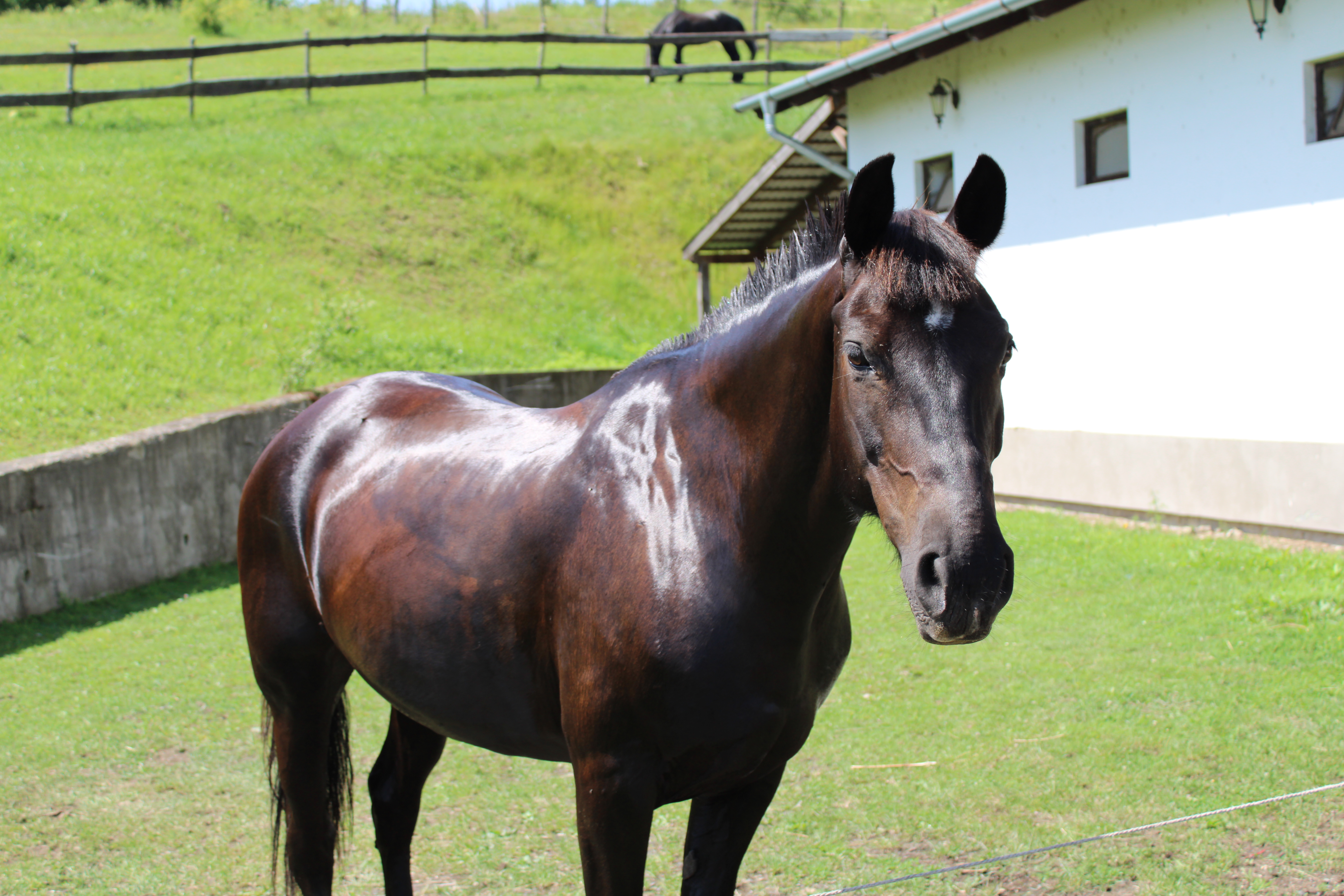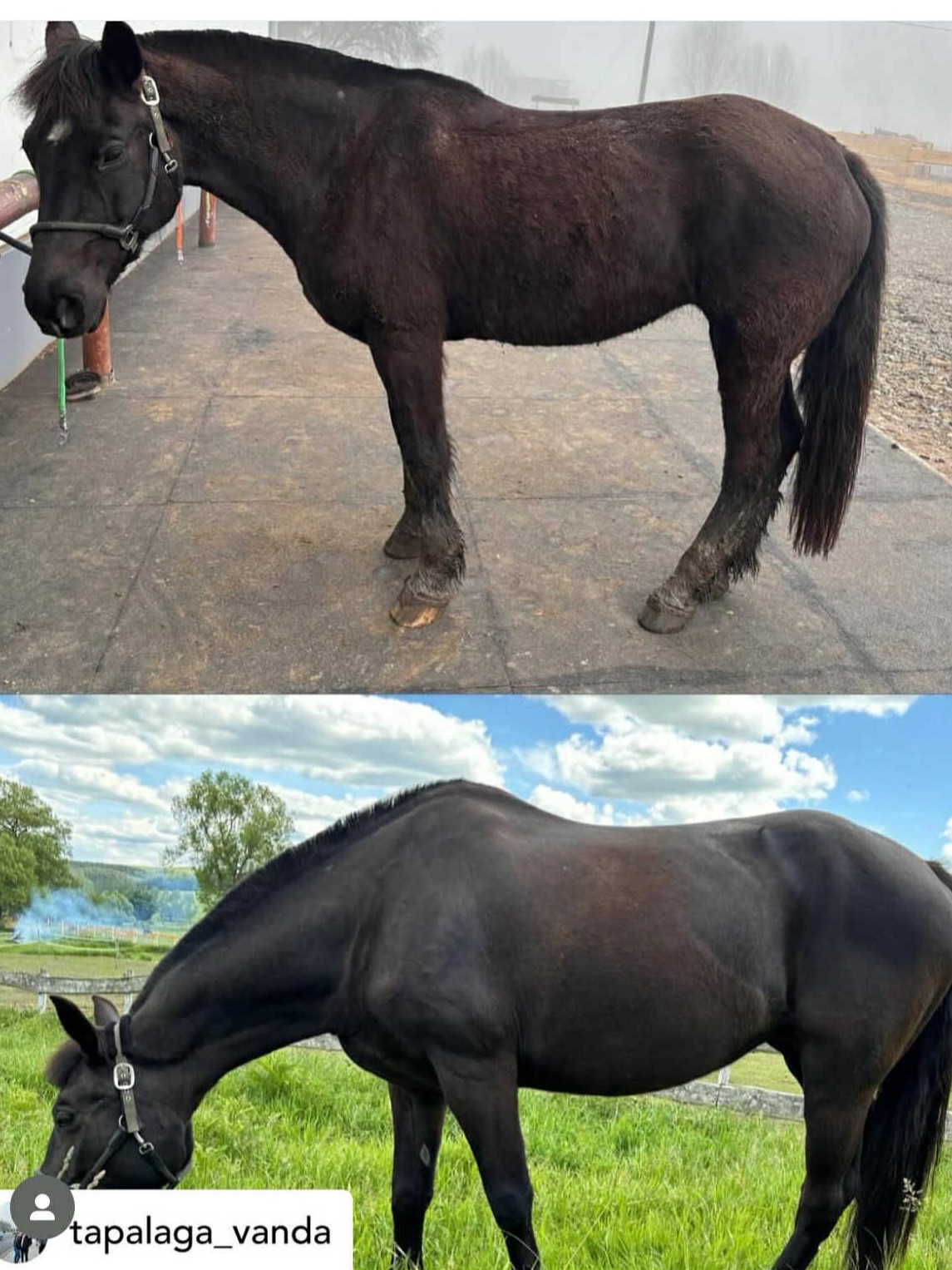Stomach ulcers – officially known as Equine Gastric Ulcer Syndrome (EGUS) – are a fairly common problem in horses. They can develop due to feeding practices, poor housing conditions, or stress. This digestive issue is surprisingly common in today’s sport and hobby horses. According to a 2015 study by Kentucky Equine Research, 90% of racehorses, 50% of leisure horses, and 25–50% of foals are affected to varying degrees.
In the photo above, you can see a before-and-after example: the horse before and after treatment for stomach ulcers. Veterinary medication combined with Meglio Horse products brought complete recovery to Csini’s life.
What is a Stomach Ulcer?
A horse’s stomach is anatomically divided into two parts:
- The lower, glandular region can resist stomach acid because it has natural protection.
- The upper, non-glandular (squamous) region is like the esophagus – it has no natural acid protection.
This is important because a horse’s stomach constantly produces acid (hydrochloric acid) – unlike humans, where acid production mainly occurs during meals.
This system works well only if the horse eats almost continuously, primarily fibrous feed such as hay or grass. Chewing produces saliva, which acts as a natural acid buffer, neutralizing stomach acid.
However, if:
- The horse eats very little (e.g., too little hay),
- The diet is dominated by concentrates (oats, corn, etc.), or
- The stomach remains empty for long periods (e.g., hay only morning and evening),
then the acid begins to erode the stomach lining, usually in the upper part, leading to ulcer formation.
Why is the Horse’s Stomach So Sensitive?
Horses are adapted to constant acid production, as their natural lifestyle involves grazing 16–18 hours a day.
If the stomach is empty or fed acid-promoting feeds (high starch or sugar), the lining becomes irritated.
Stress, high concentrate intake, infrequent feeding, and lack of exercise all increase ulcer risk.
Important: It’s not the horse’s fault – our management system doesn’t match their digestive system. Horses are not designed to be fed concentrates twice a day and kept in a stable.
Symptoms: How to Recognize Them
Ulcer symptoms are often non-specific, but watch for:
- Loss of appetite or selective eating
- Reduced performance, reluctance under saddle (kicking, stopping, backing)
- Irritability, saddle fit issues (e.g., girth sensitivity, colic-like discomfort)
- Abdominal tension, pawing, looking at the belly
- Weight loss, dull coat (despite plenty of feed)
- In foals: diarrhea, lying down more, developmental delays
- Colic symptoms
- Tucked-up abdomen
Diagnosis
The only reliable diagnostic method is gastroscopy.
- No general anesthesia is needed, just 12–24 hours of fasting.
Ulcers are graded on a 0–4 scale:
- 0 – normal mucosa
- 1 – mild irritation
- 2 – superficial ulcers
- 3–4 – deep, bleeding, very painful ulcers
Treatment: How to Improve the Condition
1. Medication
- Omeprazole (e.g., Gastrogard) is the standard protocol, a proton pump inhibitor that reduces acid production.
- Typically a 4-week course; longer for severe cases.
- Give on an empty stomach in the morning for best effectiveness.
- With proper feeding, ulcers are fully treatable.
2. Antacids / Supplements
- Products like Meglio Digest Shield combine herbs, prebiotics, and antacids to:
- Coat the stomach lining
- Neutralize acid
- Support gut microbiome
3. Diet Considerations
- Avoid raw grains (oats, barley, corn) and high-starch, high-sugar concentrates.
- Choose low-starch, low-sugar horse feed.
Why Feeding Matters
Medication alone is not enough. Without changes in feeding and management, ulcers often recur.
High starch and sugar (oats, corn, molassed feeds) rapidly ferment in the stomach, which:
- Increases acidity
- Lowers pH
- Raises ulcer risk
Additionally, concentrates do not stimulate saliva production like hay or alfalfa, so natural acid buffering is reduced.
What Can an Ulcer-Prone Horse Eat Besides Forage?
- Meglio Extra Care feed
- Molasses-free, low starch and sugar
- High fiber
- Stomach-friendly
- Vitamin and mineral fortified
- Alfalfa pellets or hay
- High calcium content → natural acid buffer
- Structured fiber → stimulates chewing and saliva
- Molasses-free beet pulp pellets
- Rich in pectin → forms a protective gel layer
- Doesn’t ferment quickly, safe energy source
- Cold-pressed flaxseed oil
- Anti-inflammatory
- Protects the mucosa
- Sugar- and starch-free
Prevention: How to Protect Your Horse’s Stomach
- Hay should always be available – ideally 1.5–2% of body weight daily (7.5–10 kg for a 500 kg horse).
- Do not feed concentrates on an empty stomach – always offer hay first or a handful of alfalfa. Split concentrate portions into several small meals.
- Avoid exercising on an empty stomach – feed hay or a small portion first.
- Reduce stress – stable rest, gradual changes, careful transport.
- Use antacid supplements – during stressful periods, e.g., Digest Shield.
- Prevent boredom in the stall – movement, companionship, and toys help.
Example: Csini’s Recovery
In the featured photo, Csini received 6 weeks of Omeprazole combined with Digest Shield, Extra Care, beet pulp, and alfalfa pellets.
Her ulcers developed due to prolonged fasting and poor stable management in her previous facility.
Although Csini is not a racehorse and not stressed, severe ulcers developed in a single bad period.
Today, gastroscopy confirms her stomach is fully healed.
Thank you for choosing Meglio!


